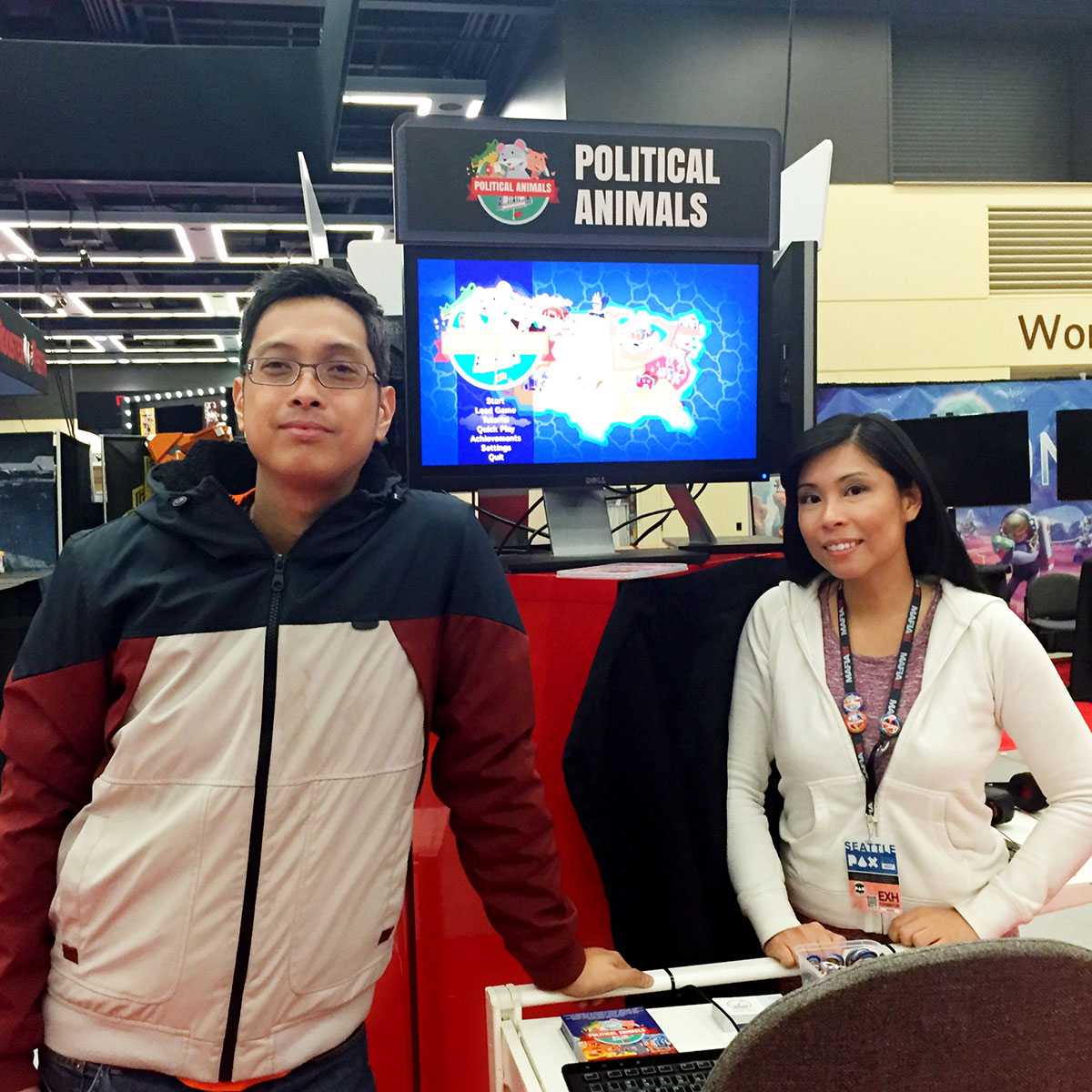
Featured Blog | This community-written post highlights the best of what the game industry has to offer. Read more like it on the Game Developer Blogs or learn how to Submit Your Own Blog Post
Lessons Learned From Two Game Launches
Despite getting front page exposure on Steam, our launch for Political Animals did poorly. Academia : School Simulator's launch sold almost 3x more units without a Steam feature. I explain why I think this was the case.

A little over a year ago I wrote a rather depressing blog post about Political Animals' launch. You can read it in full if you like, but the bottom line is the launch was a major flop despite the fact that it was featured on Steam's front page. Indiepocalypse aside, a front page feature should still have assured us a enough views to break even. It didn't. Academia : School Simulator, on the other hand, did well enough to ensure that we could continue development into the foreseeable future. In fact, despite not receiving any features from Steam, Academia : School Simulator sold almost 3 times as much as Political Animals in the same time period.
Why was that? Since we're talking about first day sales, I posit that it cannot be the actual quality of the games that mattered. Because if Political Animals was simply a bad game, what we should have seen was a flood of purchases based on that front page feature and then a subsequent amount of bad reviews, returns, and refunds. Instead, what we saw was people finding our steam page and then immediately deciding “nah, I'll pass”.
I realize now it's the months leading up to launch day that matters most. I'm going to describe and differentiate what we did for Political Animals and Academia : School Simulator with the hopes that you can use the lessons we learned for your own game launches.
Social Media
Political Animals:
This was a social media failure. While we had a Website, Blog, Twitter and Facebook accounts where we would post sporadic updates, we weren't showing anything that the players could engage with. This was our fault. Cliff from Positech would push us to do video devlogs, but we would demur from lack of ability/time. This shot us in the foot at launch, as we had not built up the requisite trust and awareness from our target market for a good launch.
Academia : School Simulator
We did a MUCH better job this time around. We decided from the beginning that we would do youtube devlogs. So as soon as we had a primitive prototype that we could show off, we started doing devlogs. They were really bad at the start, but you can see the improvement in the devlogs and the game as time moved on. We had a very strict once a month devlog rule, even when we had little to show for the month aside from polishing the game for launch. While we didn't get hundreds of thousands of views, we had an active community that was asking questions and sending suggestions, excited for every month's update.
For every devlog, we posted it on Twitter, Youtube, and our Mailing List. There was a great feedback loop where at the end of every month we would see our Mailing List numbers increase.
We've been a bit negligent on the Youtube side since launch, something I'm going to rectify at the end of the month. The honest reason is that these videos are exhausting and take up a huge chunk of time to work on. So at the end of an exhausting dev month, the last thing any of us wanted to do was to make a video of our progress. But they're the touchstone of our outreach to players, so we need to get back on it.
Conclusion
It's important to have a good, consistent media plan and follow through on it. Start as soon as you can, especially if you know you have to build up trust and create a community around your game.
Steam Store Page
This was a fail for both launches. Aside from filling up the requisite store information (which by the way takes a hell of a lot of time) we essentially did not do anything with the store pages before launch. This is a huge mistake. Like it or not, many gamers are treating Steam as a one-stop shop for their gaming information these days. So there will be a lot of people ending up on your Steam Store page that will never have heard of you before or seen your Twitter, Facebook, or Youtube account. So if they end up at your store page and there have been no updates since yo made the store page live, it will look empty, and emptiness breeds mistrust.
This is even more important for Early Access games. Because so many people have been burned by Early Access games before there is a huge hurdle of trust that you have to overcome with skeptical players. In fact, some people on our Steam discussion boards for Academia wrote saying they initially thought we were scammers because of the similarity to Prison Architect and the fact that there were no updates. The worst thing is we only saw this comment days later, making us look even more suspicious! It took us a few days to gain players' trust by sharing all of the devlogs that we had previously made on Youtube and establishing a track record of development.
Conclusion
The lesson here is that once you publish your Steam page you have to start treating it as another social network that you have to manage, if not the most important social network. An active Steam store page assures players that developers are legit and communicating with the playerbase, which gives them more confidence in the game
Conventions
Political Animals

For Political Animals we went to quite a few conventions, the most important of which were PAX West and EGX in the UK. We got some good press out of it, with Eurogamer even giving us a small writeup as one of their “Best of EGX”. We met some cool players who were super into the game, and it gave us hope that we were on the right track. Sadly, it turns out that this was not the case. We spent a lot of time and energy going to conventions around the world, but I think that money was essentially wasted, especially since for Academia we didn't even go to a single one.
Academia : School Simulator
Aside from our disappointment with the results from Political Animals, the easy answer for why we didn't go to any conventions is simply because we had nothing to show yet. We were way too early in the dev process to be showing it off.
We did go to a convention, but only to a local one in the Philippines called ESGS. While ESGS is one of the biggest gaming conventions in the Philippines, it pales in comparison to PAX and EGX. We also went there post-launch, meaning we already had a game we were selling and could sell to attendees at a significant discount. We also had a free booth courtesy of indiearena, and we wanted to support the local game industry and meet our peers while we were there.

As with Political Animals, it was great to meet the players of our games, and we even picked up some local press. We also found out later on that we'd been nominated for a local industry awards, and even ended up taking home best game! So there's certainly a lot of emotional value to be gained from doing conventions, but don't go there expecting to boost your sales.
Conclusion
There are many reasons to attend conventions. Meeting players and fellow devs, getting feedback from them, and just enjoying the experience of seeing the other games. PAX was a whole lot of fun when we didn't have to man the booth. But our experience is that they are not very good value for money.
For ourselves, I think we will only go to conventions if we can get a subsidized spot, like with the Indie Megabooth, or even a free booth as with ESGS or Busan Indie Connect. We'll only go if we already have something to sell, so that we can subsidize the cost of travel. While some devs may find value in the cons, there are many devs that completely avoid them as a policy (Rimworld's Tynan Sylvester and Zachtronics for example) but are still successful studios. That's the model we want to emulate moving forward.
Streamers and Press
Political Animals
We reached out to streamers and press a week or so (memory fails me) before launch. I think we gave press a headstart just because it takes them a little longer to write an article, but that was the gist of it. We got some pretty big streamers on board, the biggest of which was TotalBiscuit. It was amazing watching him stream the game. Unfortunately I think it was a mistake to share the game a week early. By the time the actual launch rolled around, interest in the game had dissipated. Every second between the initial impression and clicking to buy a game is crucial. Bigger studios can rely on marketing right before the game's launch to help cover for this, but for a small studio it can be the kiss of death.
Academia : School Simulator
This time around we were adamant that we wanted to close the gap between first impression and game purchase. We released keys to press and streamers a few days before launch with a loose NDA that basically said “We are releasing this to you early so you can familiarize yourselves with the game, but please release your content only after the game is available for purchase. Otherwise you will receive a long, heartfelt email full of disappointment from me.” There were one or two outliers, but for the most part people stuck to the NDA.
Just to tie this back to social media, one advantage of doing those early youtube videos and spreading the word early was that we got youtubers emailing us asking for access even after our first devlog. So they were primed and pretty pumped to share the game by the time we finally released the keys.
For Academia we used a combination of both Keymailer and Woovit, so people could choose what they felt most comfortable with. Email or Twitter was a last resort, but we would ask for some verification before we would give out the keys to avoid the inevitable scammers.
Conclusion
I realize now that I didn't really write too much about press. That's because for the most part, press outlets hold much lesser sway now than then used to. I would suggest picking out the most important one for you and sending out a personal email, then crossing your fingers.
Build a marketing strategy that will inevitably attract Streamers and press to your game. Release as close to launch as you can to maximize day one sales. Cross all fingers and toes.
Timing
Political Animals
We launched Political Animals on November 2. This was awful timing because A) It was a terribly fatiguing election (The US election in 2016) and people were sick of it and B) November is a very heavy month for launches, and we were sandwiched between some really big attention grabbers. We had no choice with this as we could not have launched any earlier, and launching AFTER the US elections might have been even worse.
Academia : School Simulator
We consciously went for a September launch. Our actual target was August but we needed just a tiny bit more time so we settled on September 8. There was less of a crowd when we launched, and I think we came out the better for it. We also had the benefit of three successive sales (Halloween, Autumn, and Winter) coming one after the other, where people are primed to buy new games. We carefully set the discount to 10% so as to be part of the sale but not undercut the value of our new game's release.
Conclusion
The general rule for indies is to try to launch around February or August because those are the quietest months of the year for launches. Given the number of games coming out every day on Steam this rule is rapidly losing currency, but I would still advise you to never try to launch in the October to December window because you will be facing up against studios with huge marketing budgets that will drown you out.
Final Thoughts
We learned from the mistakes we made with Political Animals and applied them to Academia : School Simulator. While it wasn't the best launch in the world and I'm sure we could have done better, we did do well enough to keep the lights on. In these dark days of the Indiepocalypse, that's already quite a feat.
Thanks for reading, and hope you found this useful! If you're interested, you can buy the game now! If you're not ready to buy, please wishlist, sign up for our mailing list, join the Facebook group, follow us on Twitter, or subscribe to our Youtube channel and help us spread the word!
Read more about:
Featured BlogsAbout the Author(s)
You May Also Like







.jpeg?width=700&auto=webp&quality=80&disable=upscale)








